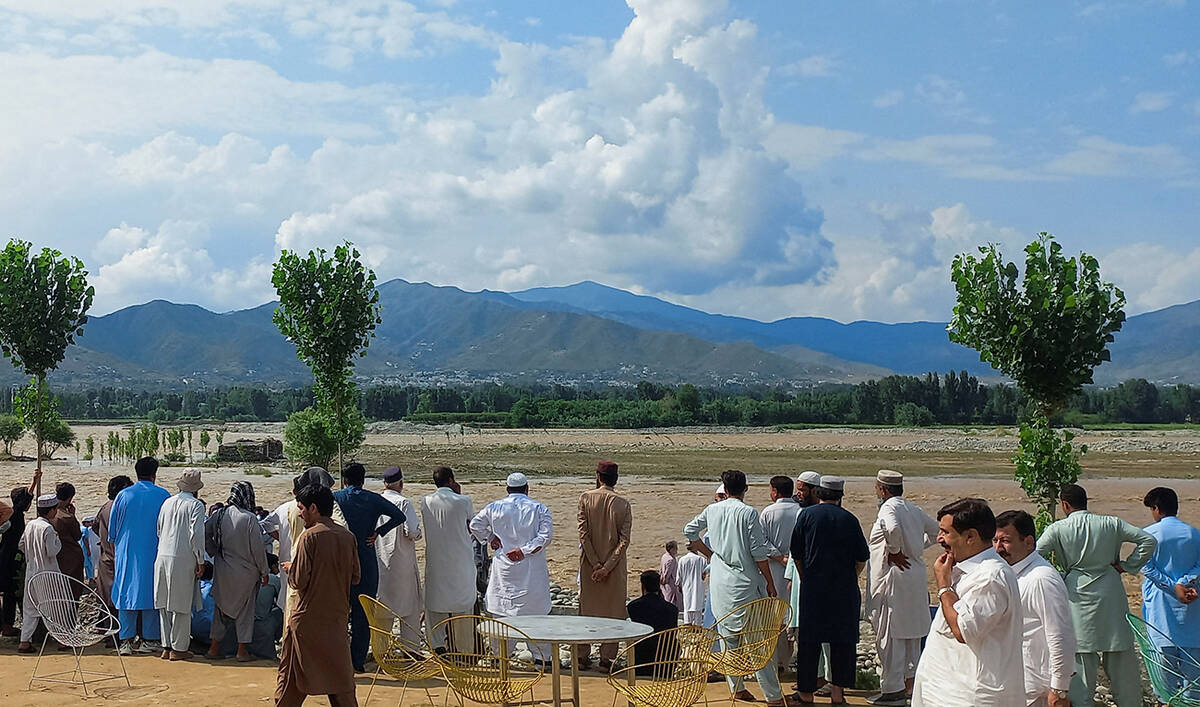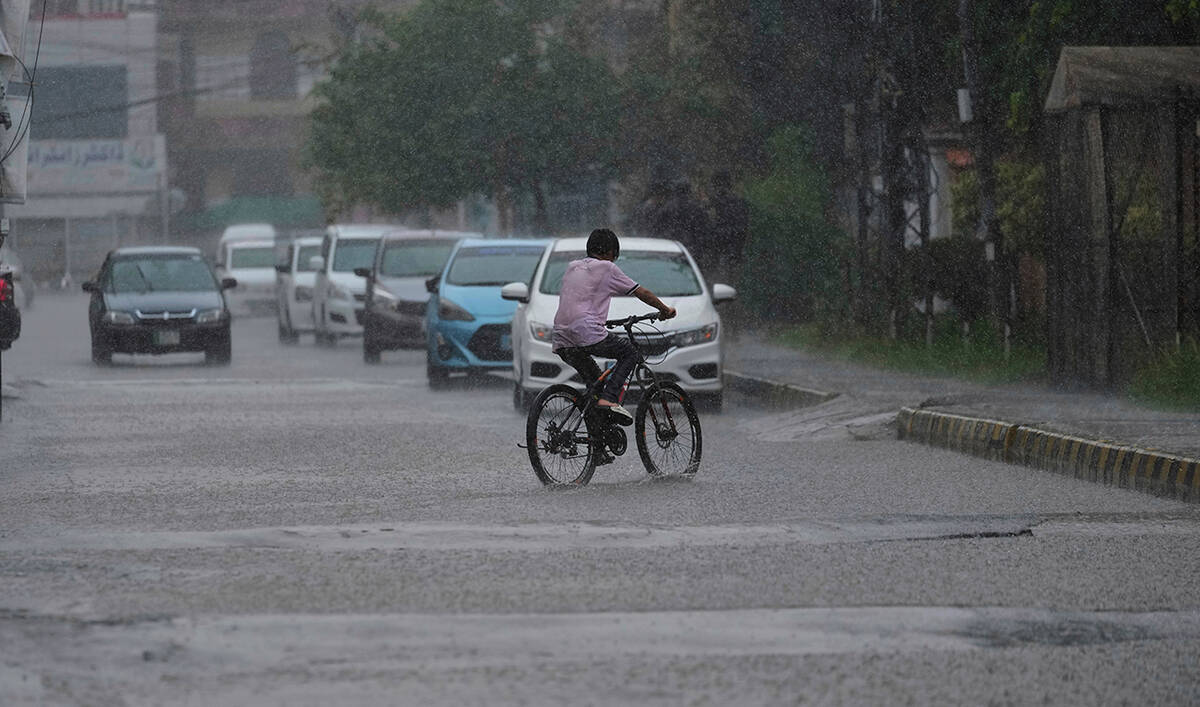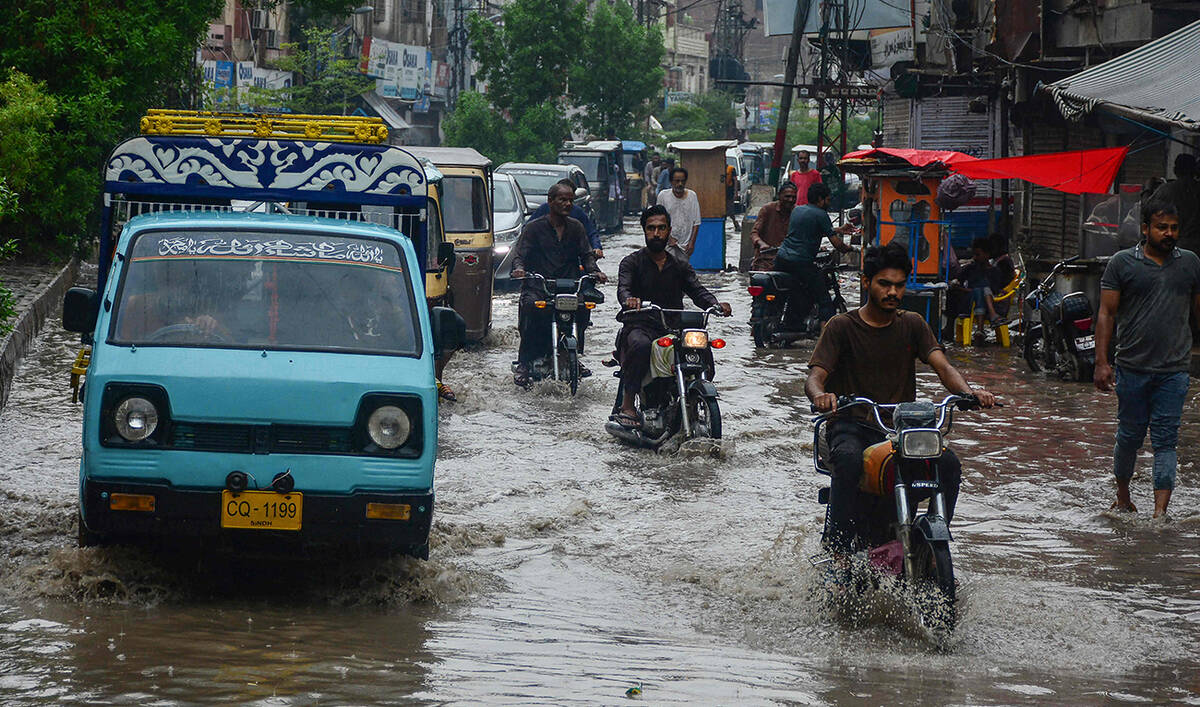ISLAMABAD: The government’s key coalition allies criticized its tax-heavy federal budget during a parliamentary session on Friday, urging authorities to adopt “people-friendly” policies as Islamabad’s hopes the document will prove instrumental in securing another International Monetary Fund (IMF) bailout package.
Pakistan’s parliament kicked off the debate into the federal budget on Thursday, with opposition party Sunni Ittehad Council (SIC) labelling the government’s move to present the budget as “economic terrorism” against the people. Islamabad has set an ambitious tax revenue generation target of about Rs13 trillion ($46.55 billion) in the budget, which was presented on June 12 by Finance Minister Muhammad Aurangzeb.
When the budget debate resumed in the National Assembly on Friday, the government’s key coalition allies distanced themselves from the taxes imposed in the finance bill, calling on authorities to levy them on landlords and the affluent class rather than the salaried group.
“If sanity fails to prevail and a public-friendly budget is not prepared, then this traditional budget is going to be the biggest threat to the country’s security,” Dr. Farooq Sattar, a senior lawmaker of the government’s coalition partner, Muttahida Quami Movement-Pakistan, (MQM-P) said during the parliamentary session.
He said the budget signaled that the status quo continued to wield power in Pakistan.
Meanwhile, Pakistan Peoples Party (PPP) lawmaker Shazia Marri confirmed that no breakthrough had been reached in talks held between the ruling Pakistan Muslim League-Nawaz (PML-N) party and the PPP’s senior leadership on their differences regarding the budget.
PPP Chairman Bilawal Bhutto-Zardari led a high-level delegation of his party to meet Prime Minister Shehbaz Sharif and the government’s senior leadership on Thursday. The two sides attempted to iron out their differences over the federal budget.
The PPP has accused the government of ignoring its recommendations in the budget. While not a member of the federal cabinet, the PPP voted for Sharif in the prime minister’s election and forms the government in Pakistan’s southern Sindh province. The PML-N-led government requires the PPP’s votes for the budget to pass.
After the meeting between the two sides ended on Thursday, a handout issued by the Prime Minister’s Office (PMO) said both sides had agreed to form committees to work out their differences over the budget.
Speaking during the National Assembly session on Friday, Marri pointed out that the government’s ministers had not attended the session.
“Relevant ministers must be present in the house during budget session,” Marri said, adding that her party was reluctant to participate in such sessions till it resolved its differences with the government on the budget.
Another PPP leader Sharmila Faruqi said both parties’ relevant committees would hold meetings to reach a consensus on the budget before voting on the finance bill takes place next week.
“Not much of a breakthrough, subsequent meetings to follow,” Faruqi told Arab News about the meeting between the two sides. “PML-N must honor its commitments to PPP.”
Meanwhile, SIC lawmaker Sajid Khan criticized the government for imposing heavy taxes in the budget on medicines and food items.
“The government should reopen border with Afghanistan from Angoor Ada [town in northwestern Pakistan] to resume trade and business activities,” he recommended.
Khan said the government should review tax measures and allocate a special budget for the development of the erstwhile tribal regions bordering Afghanistan.
“The government should allocate the promised 3 percent of the National Finance Award for the development of the tribal regions,” he said.
Pakistani government’s coalition allies distance themselves from ‘tax-heavy’ budget in parliamentary debate
https://arab.news/m5aya
Pakistani government’s coalition allies distance themselves from ‘tax-heavy’ budget in parliamentary debate

- Dr. Farooq Sattar, a lawmaker of government ally MQM-P, demands a more “people-friendly” budget
- PPP lawmakers confirm no breakthrough reached with ruling party PML-N on budget differences
Pakistan eyes $700 million in freight earnings by expanding shipping fleet — maritime ministry

- PNSC plans to add 24 vessels over three years to expand and modernize the national fleet
- State shipper earned Rs25 billion between July and March in FY25, down 18 percent year-on-year
KARACHI: The state-run Pakistan National Shipping Corporation (PNSC) is set to buy at least 24 more vessels in the next three years to generate an estimated $700 million in freight earnings, the maritime ministry said on Friday.
Pakistan currently owns 10 ships including five double-hull Aframax oil tankers and as many Supramax and Panamax bulk carriers.
“The national carrier is now targeting to increase its cargo handling to 52 percent by volume and 43 percent by value (excluding containerized cargo) within three years,” the ministry said in a statement.
Federal Minister for Maritime Affairs Muhammad Junaid Anwar Chaudhry announced the three-year plan in a meeting held in Islamabad to discuss the government’s business strategy to revitalize the maritime and logistics sectors.
The move is part of Prime Minister Shehbaz Sharif’s strategy to renew and expand Pakistan’s aging shipping fleet in a phased manner to enhance cargo capacity, fuel efficiency and compliance with International Maritime Organization standards, including those governing carbon emissions and ballast water management.
The plan, if implemented, would boost the revenues of the national flag-carrier, whose income from shipping business declined 18 percent to Rs25 billion ($88.5 million) in July–March this year compared to the previous one, according to PNSC’s financial results posted on the Pakistan Stock Exchange website.
Muhammad Arshad, the ministry spokesman, told Arab News that Pakistan’s current fleet will be more than doubled with the induction of 13 vessels in the first year.
Eight vessels will be bought in the second year and three in the third, which would take the total to 34 vessels in Pakistan’s fleet by 2028.
“PNSC currently manages approximately 11 percent of the country’s cargo by volume and 4 percent by value,” the ministry said.
During the meeting, the minister proposed deepening collaboration between the PNSC, Karachi Shipyard & Engineering Works and local industries for the local manufacturing of modern cargo vessels, oil tankers and container carriers.
“This initiative is expected to create skilled employment, strengthen local supply chains, boost industrial activity and rejuvenate Pakistan’s shipbuilding sector, positioning the country as a regional maritime hub,” it said.
The cash-strapped country plans to finance its modernization efforts without burdening the treasury through leveraging public-private partnerships, maritime leasing models and tapping into global green shipping funds.
The government is trying to revive Pakistan’s debt-ridden economy with the help of the International Monetary Fund and has set a tax revenue target of Rs14.3 trillion ($50 billion) for the next financial year starting July.
Last week, the prime minister directed the authorities to lease new vessels to expand the PNSC’s fleet with an aim to reduce the $4 billion annual foreign exchange burden on sea-based trade.
Pakistan looks to bolster its maritime trade capacity and reduce reliance on foreign shipping lines, which officials say significantly contributes to the country’s widening trade deficit and puts pressure on foreign exchange reserves.
Flash floods in Pakistan’s northwest kill 11 as rains trigger landslides, house collapses

- PDMA calls Swat the hardest hit area, where flooding, landslides and flash torrents killed 10 people
- Pakistan is bracing for extreme monsoon season, ramping up efforts to deal with potential calamities
PESHAWAR: At least 11 people, including four children, were killed and six injured after flash floods and landslides triggered by monsoon rains swept through Pakistan’s northwestern Khyber Pakhtunkhwa (KP) over the past 24 hours, officials said on Friday.
According to the Provincial Disaster Management Authority (PDMA), heavy rains caused flooding in the Swat River near Khwazakhela, damaging homes and infrastructure in several areas.
Swat was the worst-affected district, where 10 of the 11 reported fatalities occurred.
“According to the PDMA’s preliminary report, a total of 11 people have died and six others were injured,” the authority said in a statement. “The deceased include four men, three women, and four children, while the injured include three men and three women.”

“Swat district was the hardest hit, where flooding, landslides and flash torrents killed 10 people and injured six,” it added. “A total of 56 homes were damaged in the affected areas, six of them completely and 50 partially.”
The PDMA statement said its Emergency Operations Center was active and coordinating with district administrations, rescue services and relevant departments.
Flood alerts have also been issued to district administrations in Nowshera and Charsadda in KP, with instructions to implement preemptive safety measures in anticipation of further rainfall.
The statement informed the PDMA has supplied 136 trucks of non-food relief goods to district authorities as part of its monsoon contingency plan.
These include tents, tarpaulins, kitchen sets, blankets, pillows and sleeping bags. An additional Rs450 million ($1.62 million) has been disbursed to local governments for immediate relief and compensation needs.
Monsoon rains in Pakistan often cause widespread flooding and damage, particularly in mountainous northern regions.
Earlier this week, Pakistan’s National Disaster Management Authority (NDMA) warned of heavy rains and flash floods in several parts of the country from June 26 till June 28.

It advised residents in flood-prone areas, particularly near nullahs, low-lying zones and slopes, to remain alert and avoid unnecessary movement, calling on emergency services to ensure readiness for any potential incidents.
Pakistan is currently bracing for another extreme monsoon season and ramping up efforts to deal with any potential calamity.

In 2022, deadly floods brought by record monsoon rains and glacial melt killed over 1,700 people and impacted 33 million people in Pakistan. Raging currents swept away homes, vehicles, crops and livestock in damages estimated at $30 billion.
Pakistan’s top court rules Imran Khan’s party ineligible for reserved parliamentary seats

- The court sets aside earlier ruling in PTI’s favor, upholds Peshawar High Court verdict
- Khan’s PTI calls ruling a ‘funeral of justice’ as government welcomes the decision
ISLAMABAD: Pakistan’s top court on Friday ruled the Pakistan Tehreek-e-Insaf (PTI) party of jailed former prime minister Imran Khan is not entitled to reserved seats in the national and provincial legislatures, setting aside an earlier judgment that had granted the party its share.
The Supreme Court’s Constitutional Bench dismissed all review petitions filed by PTI and allied petitioners, reinstating the Peshawar High Court’s earlier ruling rejecting the allocation of reserved seats to the party.
“The impugned majority judgment dated 12.07.2024 is set aside… and the judgment rendered by the Peshawar High Court, Peshawar is restored,” the short order read.
The dispute about the reserved seats stems from the February 8 general elections, where PTI candidates contested as independents after the party lost its electoral symbol for not holding valid intra-party elections, as required under the Elections Act.
Despite winning the most general seats in the national polls, the Election Commission of Pakistan (ECP) ruled that PTI was ineligible for reserved seats for women and minorities in parliament, which are allocated based on proportional representation from among the seats won by political parties.
Last year in July, the Supreme Court reversed the ECP’s decision, terming it unconstitutional and ordering the reserved seats to be allocated to PTI.
However, the government subsequently passed amendments to the Elections Act, 2017, in a move widely seen as targeting PTI’s eligibility for reserved seats.
The revised law stipulated that only those candidates who had formally declared their party affiliation before the returning officer — and whose party had submitted lists of nominees for reserved seats within the legal deadline — would be entitled to such allocations.
Since PTI-backed candidates contested the February election as independents, and the party did not submit lists for reserved seats, the amendments effectively barred it from claiming a share.
With Friday’s verdict, the apex court has now ruled that the independents backed by PTI in the February election cannot be treated as party nominees for the purpose of seat allocation.
Responding to the development, Khan’s party described the short order as the “funeral … of justice” in a social media post.
The government, on the other hand, welcomed the decision, with Prime Minister Shehbaz Sharif congratulating its legal team’s “tireless efforts.”
“The decision has upheld the supremacy of the Constitution and law, and ensured correct interpretation of legal provisions,” he said in a statement.
“The opposition should now join the government in playing a constructive role for the country’s development and prosperity,” he added.
The reserved seats in question will now be allocated to other political parties, including Sharif’s Pakistan Muslim League-Nawaz (PML-N) party and its coalition partners.
The top court’s verdict will numerically strengthen the government while dealing yet another blow to Khan’s PTI, which has faced legal and political challenges since the downfall of its administration in a no-confidence vote in April 2022.
Pakistan won’t turn blind eye to allies’ wrongdoing, says deputy PM on US strikes in Iran

- Ishaq Dar says Pakistan ‘didn’t hesitate or delay’ in condemning US strikes, despite improving ties with Washington
- The United States launched airstrikes in Iran this month, claiming to have set back Tehran’s nuclear program by years
ISLAMABAD: Pakistan’s Deputy Prime Minister Ishaq Dar said on Friday his country did not turn a blind eye to US airstrikes on Iranian nuclear facilities earlier this month, adding that close relations with a country do not justify silence in the face of wrongdoing.
The statement came during a news briefing in the federal capital, where Dar spoke to the media about Pakistan’s recent diplomatic engagements, including his participation in the Organization of Islamic Cooperation (OIC) meeting in Istanbul and the Pakistan-United Arab Emirates Joint Ministerial Commission.
Despite a recent revival in bilateral ties with Washington, Pakistan formally condemned the US strikes in a statement, calling them a violation of international law and affirming Iran’s right to self-defense under the UN Charter.
“Just because relations are good with a country doesn’t mean you should consider something wrong to be right,” he told the media.
“As you witnessed, we didn’t hesitate or delay,” he continued. “I spoke with the foreign secretary, gave a task to the spokesperson and we exchanged draft statements. It’s now a part of the historic record: we criticized the attack, and we did it on record.”
Dar’s remarks came in the wake of a 12-day conflict between Iran and Israel that erupted after Israeli strikes targeted Iranian nuclear and military sites, prompting retaliation from Tehran.
The war began while the administration in Tehran was holding nuclear negotiations with the US that later joined the fray, launching its own strikes on three Iranian nuclear facilities.
While Washington said the attacks had set back Iran’s nuclear program by years, there was international concern over a wider regional war.
Dar said he had been personally involved in formulating the country’s response as Islamabad prepared its official statement.
Pakistan, currently a member of the United Nations Security Council (UNSC), also raised the issue at the world body in New York.
Pakistan approves 10% gas price hike for industry, power plants under IMF conditions

- ECC spares households in gas price hike, with only fixed charges adjusted to recover costs
- It also approves grant for defense ministry to cover shortfall in salaries, allowances and dues
KARACHI: Pakistan on Friday approved a 10 percent increase in natural gas prices for industrial users and power plants starting next month, in line with reforms mandated by the International Monetary Fund (IMF) to ensure cost recovery and tariff rationalization, an official statement said.
The decision was taken by the Economic Coordination Committee (ECC) of the Cabinet, chaired by Finance Minister Muhammad Aurangzeb.
While prices for bulk consumers and gas-fired power plants will rise, household consumers will be shielded from the increase.
“To protect household consumers, gas prices will remain unchanged, with only fixed charges revised,” the Finance Division said in a statement released after the meeting. “However, prices for bulk consumers, industrial units and power plants will be increased by an average of 10 percent.”
The statement said the revised pricing structure, submitted by the Petroleum Division, complies with regulatory obligations under the OGRA Ordinance and meets structural benchmarks under Pakistan’s ongoing loan program with the IMF.
It also supports a shift from cross-subsidies to direct, targeted assistance for low-income consumers.
DEFENSE GRANT
The ECC also approved a Rs15.8 billion ($55.3 million) supplementary grant for the Ministry of Defense to cover a shortfall in salaries, allowances and pending dues.
The funding includes disbursements under the prime minister’s compensation package for martyrs of the recent Pakistan-India war fought last month.
In a separate decision, the committee gave in-principle approval to launch a risk coverage scheme for small farmers and underserved regions by August 14.
The program is expected to bring 750,000 new borrowers into the formal credit system and unlock a Rs300 billion ($1.05 billion) agricultural loan portfolio over three years (FY2026-28).
The statement said the total budgetary support for the scheme, covering risk coverage and bank operating costs, is estimated at Rs37.5 billion ($131.25 million), to be disbursed between FY2027 and FY2031.
The government has directed relevant ministries to incorporate additional safeguards before the official rollout.











